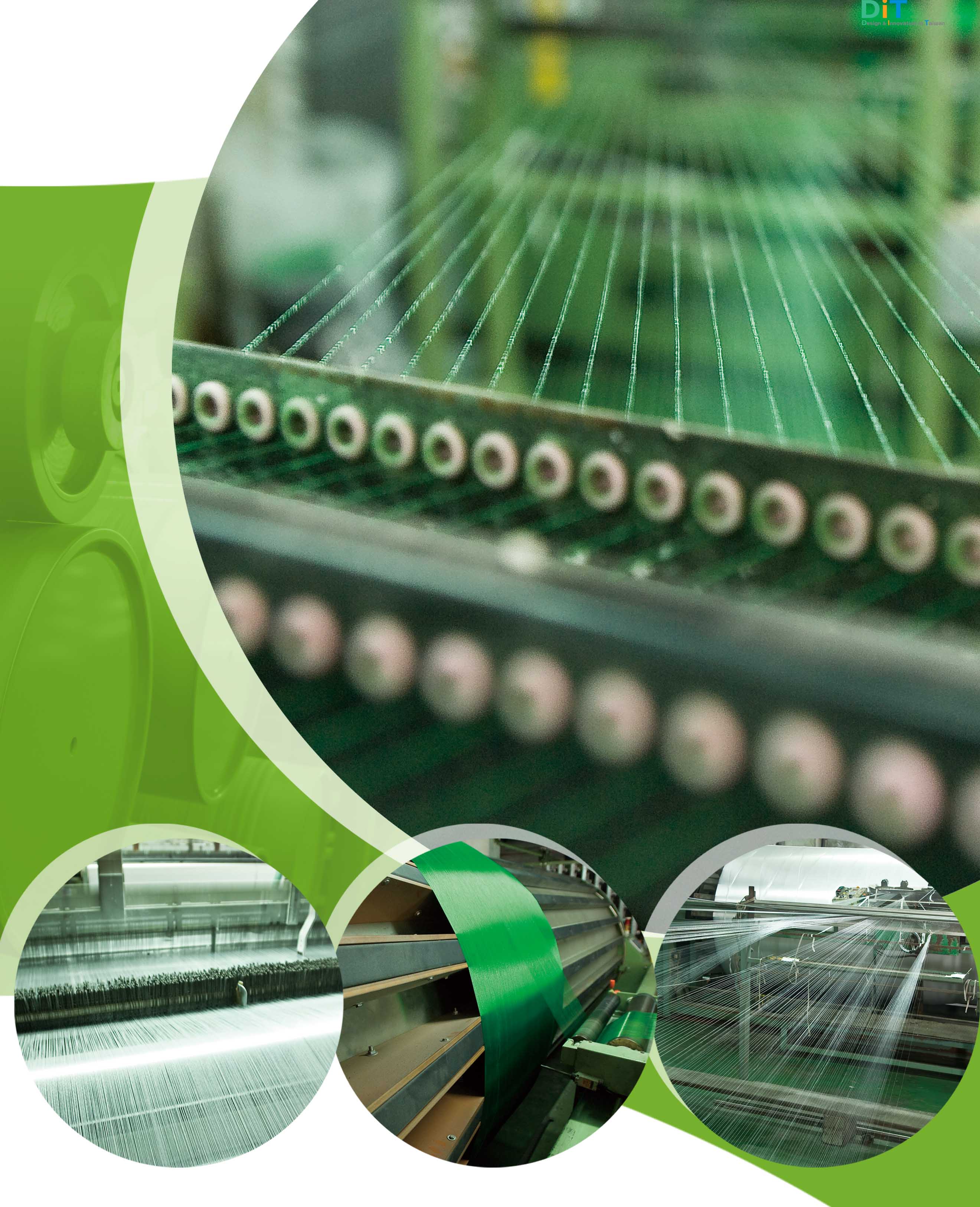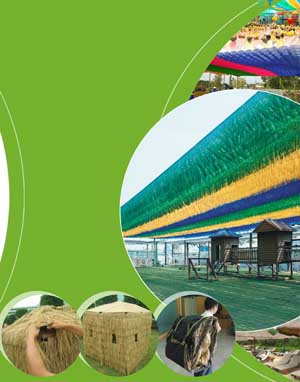Ji Ten Plastic Shows Utilitarian Netting Can be Improved via R&D
Maker’s PE string successfully sim
2010/04/09 | By Steve Chuang | JI TEN PLASTIC INDUSTRIES CO., LTD.Plastic netting is certainly one of those products made by a traditional manufacturer that hardly ever commands attention in industry magazines or is even seen as weighty or valuable enough to garner serious R&D investment. It is one of those products that blends into the background of daily life without causing grey matter to stir, for such products are taken for granted as door mats; unless if you happen to be Ji Ten Plastic Industries Co., Ltd., whose ambition to lead the plastic netting sector has proved its peers that even utilitarian plastic netting can be improved via R&D.
Typical of a traditional manufacturer in Taiwan, Ji Ten began in 1972 with a 330-square-meter factory in Changhua County, central Taiwan, by manufacturing plastic nets and meshes. After 30 years of synthetic yarn spinning and net weaving, the company has evolved into a leader in the line in Taiwan, running two factories to turn out 1.7 million yards of various netting products per month, leaving most of its peers behind in monthly output.

The company is a reliable subcontract maker whose products include shade mesh, leisure cloth, agricultural plastic nets that can act as bird barrier, orchard nets, window screens, construction safety nettings, sieves etc., all of which may be made of nylon or P.P. (polypropylene) and in colors as ordered. In addition, this maker also widely adopts P.E. (polyethylene) that is fully biodegradable and eco-friendly to meet rising demand for green plastics.
Stay Planted
Despite fierce competition and seeing a number of Taiwanese traditional manufacturers move production abroad to emerging countries in the 1990s, M.H. Ko, company president, has still insisted on staying in Taiwan and taken actions to reinforce his firm’s production capability to stay competitive in the global market for nettings.
Ji Ten procures from Sulzer Ruti, a globally famous weaving machine supplier in Switzerland, various automated weaving, spinning and related machines, which have helped the firm to build a solid business. And clearly conscious of the importance of continual mechanical accuracy, the machine tools are periodically calibrated with help from technical advisors from the Swiss supplier, according to Ko.
Also definitely not cutting corners in quality control, including checking raw material, spot-checking and pre-delivery testing in its factories, Ko says that all quality inspections are conducted numerically in accordance with international standards to minimize human error.
Backed by automated production and world-caliber quality control system, the company turns out sunshade mesh and bird-barrier nets, for instance, that are colorfast and last up to 10 years, far superior to similar products, Ko says, adding, “We also effectively handle OEM and ODM orders thanks to our strong production capability.”
Achieving Milestone
Truly making every man-hour and dollar invested in R&D worthwhile, Ko says, “We not only focus on improving conventional and out-of-date nets, but also try to develop new ones that are rare, niche products to differ from competitors.” Sticking to such motto, the company has achieved a milestone of sorts by launching the “plisse (French for wrinkled and creased) insect window net.”
Presently this high-end window screen segment bars virtually all makers in Taiwan, especially SMEs (small and medium-sized enterprises) who simply can’t afford to spend too much to upgrade production requisite to clear enormous technical and other thresholds, according to Ko, adding that only a few companies, mostly in Japan, produce plisse window nets. He implies that starting this line of product independently would be a Herculean mission.
Devil is in Details
Knowing to succeed calls for making plisse window nets that exceed in quality competing models, Ko says that the company focused on improving weaving and spinning techniques and synthetic yarns to solve a common problem: strands in traditional insect screens separate easily due mainly to weak weave structure that is largely a function of weaving method and type of yarn.
Despite being experienced in weaving, Ko and his R&D engineers were novices at developing suitable yarns, which calls for expertise in organic chemistry and material science. Ko says that, after failing several times, they finally came up with PE and PP blended yarns, which, despite needing more complicated polymerization, could effectively strengthen the weave structure of plisse window screens.
More hurdles had to be cleared. Ko says that, even after having developed the seemingly ideal blended yarn, the company needed weaving and spinning machinery for volume and quality-consistent production. So Ko cooperated with European mechanical engineering experts to overcome such issue. Learning while doing, Ko and his staff ultimately succeeded in developing suitable machine tools to enable Ji Ten to mass produce improved plisse window screens.
“Spending around two years to complete the whole R&D project, despite the enormous effort, was worth it. Our plisse window screen with unbeatable quality and competitive prices have been hot-sellers in Japan and Europe for three years, helping raise company profile in the line,” says Ko. Apparently also a slick promoter, Ko says that besides comparatively low defective rate, customers are also impressed by its UV resistance, good ventilation and, above all, excellent color evenness in black and gray, which enhances added-value in terms of improved aesthetics to make such item versatile for residences and commercial buildings.
Expanding Applications
To achieve sustainable development by expanding application ranges of synthetic fiber, Ko has also been participating in global exhibitions and exchanging information with customers worldwide.
Citing a real-world example of tweaking a synthetic product to simulate natural characteristics to exceed original durability and perhaps even aesthetic qualities, Ko says that the company was to supply a client with natural straw or fiber for beach umbrellas at holiday resorts; but driven by innovative spirit, Ko convinced the client of the superior qualities of PE fiber over natural counterparts, which tend to break down quickly to need troublesome replacement. Eventually, the company did chromatic analysis and studied dying techniques to develop an eco-friendly PE string that simulate straw-like hue and texture to successfully satisfy the client.
An added bonus has been the versatility of this straw-like PE fiber: hunters also find it a good camouflage while farmers use it to make scarecrows, according to Ko.
Ji Ten’s achievements continue. Thanks to Ko’s expertise in synthetic yarns, the firm has independently developed a plastic fabric that is a key component to produce conveyor belts. Meeting the critical properties of a conveyor belt fabric, Ji Ten’s plastic textile is antistatic, quiet, wear-resistant, has high tensile strength, and minimal elasticity, making it more durable than existing counterparts,” says Ko.

Reality of Business
Conceding to a harsh reality of doing business, Ko says that the firm, being a midstream supplier of semi-finished materials, has to always try to turn synthetic yarns or dated netting into innovative, improved, special-application materials to enable downstream customers to realize concepts, or even new products.
Ji Ten will also continue to pay attention to developing end-user products as window screens and build bigger distribution networks to widen global market shares.
Revealing the secret to growing for some 30 years, Ko says that his company is committed to delivering good quality products on-time to build sound partnership with customers.
JI TEN PLASTIC INDUSTRIES CO., LTD.
No. 137, Lane 22, Changting Rd., Ting Fan Li, Lukang Town, Changhua Hsien 505, Taiwan
Tel:+886-4-771-1621;771-1631
Fax:+886-4-771-6328
http://www.ji-ten.com
E-mail:[email protected]

